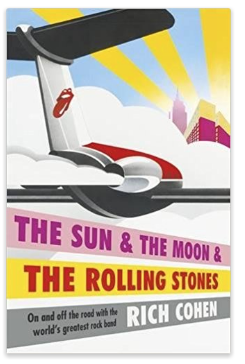I recently read “The Sun & The Moon & The Rolling Stones” by Rich Cohen. Below are the quotes I found most interesting. If you like the quotes, buy the book.
 “An artist needs a belief. It does not matter whether that belief is Rastafarianism or Communism. It’s the structure of belief that matters – it gives their work coherence, shape. It’s there even when you don’t know it.” (21)
“An artist needs a belief. It does not matter whether that belief is Rastafarianism or Communism. It’s the structure of belief that matters – it gives their work coherence, shape. It’s there even when you don’t know it.” (21)
“There’s a moment when your real life starts, when you realize that what came before was prelude. Old friends and mentors – you shed them like baby teeth and you’re free.” (43)
“No more than a handful of people turned out. Gomelsky puts the number at three. When Brian asked, “What should we do?” Giorgio said, “What do you mean? Play!” You don’t punish the people who showed up for the sins of those who stayed home.” (62)
“There’s tremendous power in being first. In birth order, in the mysterious circle of fame. Being first means being free to invent and go it alone. Being in any place but first means riding the wake. It means being defined in comparison. It means being the next Beatles, the anti-Beatles, the new Beatles, or the shitty Beatles.” (66)
“When I was a boy, my father… told me that life is 99 percent marketing. “You’re better off with a great salesman and a mediocre product, than with a masterpiece and a moron to sell it.”” (78)
“Every now and then, a nation experiences a caesura, a pause between eras. To those who recognize such things, it’s an opportunity. Because a death is a birth and an exit is an entrance. Because you can only weep for so long. Because after tears you need laughter. As America emerged from its nightmare, Americans wanted something untainted with tragedy, fresh and new. It’s no coincidence that the Beatles landed in the United States less than three months after the Kennedy assassination.” (85)
“The Beatles had changed the rules; a band had to write songs. Bob Dylan made it even more important. It was about authenticity. A singer singing his own words is an artist; a singer covering someone else’s words is an actor.” (105)
“American rock stars aspire to immortality. They want to be James Dean and die beautifully. British rock stars aspire to aristocracy. They want to acquire titles and houses with names.” (155)
“In art, you have a choice, though you probably won’t realize it at the time. Posterity or right now.” (173)
“Forget the fact that open G had been around for years – if Richards stole the sound from Ry Cooder, why don’t Ry Cooder songs sound anything like the Stones? Why aren’t they nearly as evocative, menacing? IT gets at a deep unfairness: all the skill in the world does not add up to genius. Ry Cooder is a technically better player than Keith Richards, was goofing with open G first, and was after some of the same effects, but he did not have that same artistic soul.” (191)
“Mick’s showbiz, a pop version of the classic Hollywood diva, for whom the show must always go on, for whom obscurity is even more terrifying than death. It’s a special kind of charisma that generates tremendous light but little heat. People crave that light but get no sustenance from it. It destroys them. Life with Mick is life astride a black hole. Time accelerates. Two years ages you immeasurably. Yet none of it touches him. Because no one else matters. He’s the ego that became the world. He stands before the millions but the millions don’t exist. At the center of the universe, Mick Jagger dances alone.” (200)
“As you get older you’ll notice that no matter what direction you walk, you’re walking away.” (200
“Art is not linear; it’s circular. An artist does not improve, nor progress. He simply rides the wheel, waiting for the clouds to break and the sun to appear.” (230)
“Hemingway said: When they attack, they attack precisely what is strong, unique. What critics really want is a slightly different version of what they already love. If you give them something new, they will hate you. At first. But great work invents its own genre.” (277)
“The moment you build a shrine, you’re saying the past is more important than the present.” (307)
Liked the quotes? Buy the book here.


